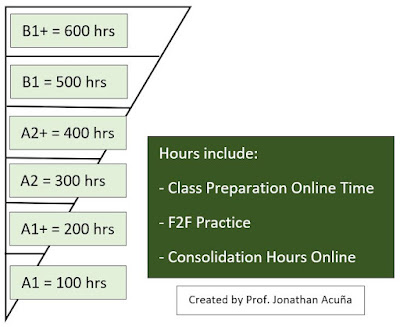Panama
City, seen from Old Panama, Panama
Photo
by Jonathan Acuña (2017)
Hours Do
Count
When Learning
English Online
A bit of feedback
for the self
By Prof. Jonathan Acuña-Solano, M. Ed.
School of English
Faculty of Social Sciences
Universidad Latina de Costa Rica
Sunday, August 11, 2019
Post 336
Have you ever been to Panama City? If
you have, the city today has turned into a maze where one can easily get lost
with countless skyscrapers overlooking you every step of your way. This same
kind of feeling is what I have been experiencing when finishing piloting an English
online program with local students over here in my home country, Costa Rica. However,
when being in Panama City, it was much easier to use Google Maps or to call an
Uber cab to find your way easily in the city. But, when thinking back on learning
English in an online context, what is the map that must be followed to see how
the CEFR language proficiency levels actually work in an online learning
context?
I have often been asked if learning
English online is easy when compared to a F2F context. When learners ask me
this question, I often recall my former boss’s insight into language learning
in a virtual environment. “Distance education is not for everyone,” she said
while stating her disbelief and skepticism in developing language mastery
without coming to class with a teacher and other students. Her viewpoint did not
match mine, especially after being able to achieve serval associate degrees
online through English but not linked to studying a foreign language. What I concluded
was that all this is not about being tough; it is about being different. Online
language learning is possible, but it may take longer than a full F2F program.
English language mastery is a process
that does not happen overnight; it requires time for a student to develop his
foreign language and in turn its mastery. The question over here is “How long
does it take an online language student to develop his command of the target
language? And this has to be clearly stated that any amount of hours of
language exposure is difficult to calculate despite the number of hours publishing
houses claim a series of theirs can help develop a foreign language. Any random
amount of time only adds uncertainty when one is looking for studies (the map
to cross the maze) that can help you match language development and time needed
to achieve a given CEFR level.
What I have been able to experience
with several online groups of language students of mine is that each phase is
different; time constraints are not the same for each step of the CEFR way. Since
every step of the CEFR ladder, or as the inverted “so-called” pyramid included
below states, it is important to divide each level into a base one and a plus (+) one
as already done by the Global Scale of English (GSE) created by Pearson
Education (2016). GSE can help us “improve the quality and relevance of [our]
English classes” (Pearson Education, 2016). This toolkit can help us visualize
the real learning objectives students are to master at a given point in their
language development, along with “grammar and vocabulary to help [teachers]
plan lessons that are at the right level for […] students (Pearson Education,
2016).
Based on very empirical evidence taken
from my ethnographies and reflective journaling and trying to match them with
Pearson Education’s GSE, to have language learners achieve a B1+ level of
language commands, some 600 hrs are needed. Adult learners who participated in four
45-hr courses for 15 weeks (totaling 60 weeks) of a four-level program could
not make it to B1. And why not? The reason has to do with the time needed for
consolidation and for internalization of the new content covered along the
program. What was witnessed is the importance and relevance of dividing CEFR
levels into two (A1 & A1+) to help thee adult students work on course
content and achieve language mastery.
As stated above, with just empirical
evidence and reflective journaling, 600 hours of language work is necessary to
achieve a B1+ for an online student who has a platform and synchronous sessions
with an instructor and a class. The way our courses were constituted included
45 hours of synchronous sessions to work on the content that students
previously worked on the course language platform. On the other hand, this
online asynchronous work is meant to be self-regulated by the learners and
monitored by the instructor. And though students probably work some 120 hours
on online course content in the platform, they barely have “real mastery” of that
content. Autonomous study must be done along with online videoconferencing
sessions where they can really get to work the course content in meaningful
ways.
To conclude, it is a must to revisit
the program structure to modify it to really herd students toward a B1 level. Many
more hours of class practice are needed even though these hours are just
dedicated to practice. Practicing extensively in tough content for the students
is also mandatory to make these hours true learning and CEFR level achievement
for all students.
References
Pearson Education (2016). GSE Teacher Toolkit.
Retrieved from English.Com: https://www.english.com/gse/teacher-toolkit/user/lo?page=1&sort=gse;asc&gseRange=22;26&audience=GL










Post a Comment